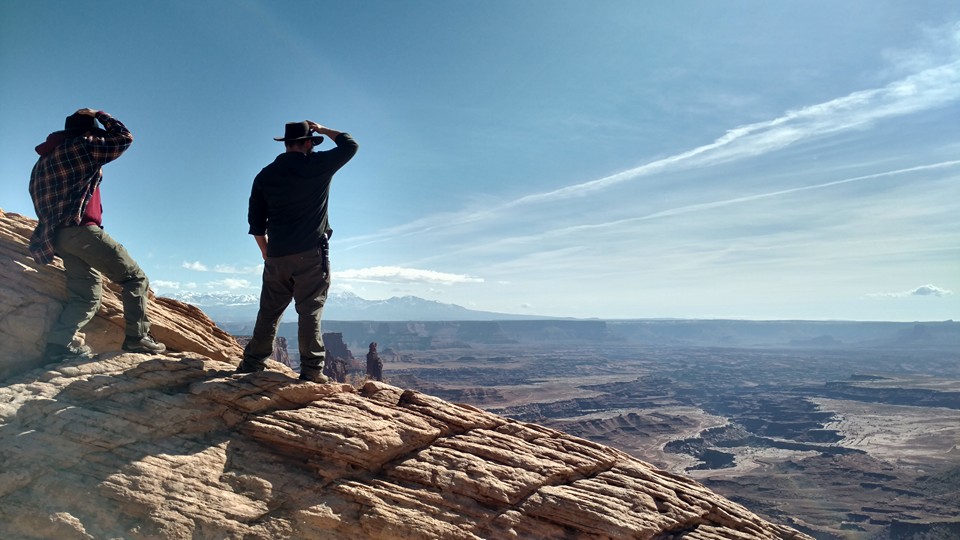ASSISTANT PROFESSOR of EVOLUTIONARY ECOLOGY
The Department of Anthropology at the University of Utah invites applications for a tenure-track position in evolutionary ecology at the rank of Assistant Professor to begin July 1, 2021.
The Department of Anthropology at the University of Utah invitesapplications for a tenure-track position in evolutionary ecology at the rank ofAssistant Professor to begin July 1, 2021. We seek diverse candidates whocomplement this historical strength of the department and take aquantitative, empirical approach to the study of human behavior, biology, orevolution.
Qualifications: Applicants must have a Ph.D. in Anthropology or a relatedfield by
the time of appointment, an established record of high-qualityresearch indicated by
external funding and publications, and evidence ofrelevant teaching and field work
experience. A competitive application willpresent evidence of teaching and research
excellence, or potential for thesame. We seek candidates whose research, teaching
and service hasprepared them to contribute to our commitment to engagement andinclusion
of culturally diverse audiences.
The selected candidate will be expected to teach undergraduate andgraduate courses,
develop a productive and externally-funded researchprogram, direct graduate research,
and exhibit a commitment to service tothe department, college, and university. Salary
is competitive and dependenton qualifications and experience. The University of Utah
is an AA/EEO employer.
The Department of Anthropology is actively working to remove barriers thathave been traditionally encountered by individuals from underrepresentedgroups; strives to recruit faculty who will further enhance our diversity; andmakes every attempt to support their academic, professional, and personalsuccess while they are here. The University of Utah recognizes that a diversefaculty benefits and enriches the educational experiences of the entirecampus and greater community. The University of Utah offers benefits tospouses, and to same- and different-sex domestic partners.
Salt Lake City is a mecca of outdoor recreation praised for its scenic beautyand home to a robust array of diverse communities facilitating numerousopportunities for interaction with a range of civic and political organizations.Utah public schools serve a diverse student body (statewide average: eightpercent ELs [English Learners] and twenty-six percent non-white), notablyhigher in its urban districts. Utah is also home to the first state-legislated andfunded K-16 dual language education model in the country.
We acknowledge that this land, which is named for the Ute Tribe, is thetraditional and ancestral homeland of the Shoshone, Paiute, Goshute, andUte Tribes. The University of Utah recognizes and respects the enduringrelationship that exists between many Indigenous peoples and theirtraditional homelands. We respect the sovereign relationship between tribes,states, and the federal government, and we affirm the University of Utah’scommitment to a partnership with Native Nations and Urban Indiancommunities through research, education, and community outreachactivities.
OUR DEPARMENT
The University of Utah has one of the oldest Anthropology programs in the nation. Since the 1980s, the Department of Anthropology has played a leading international role in developing and applying the theoretical perspective of Evolutionary Ecology within the discipline of Anthropology. This fosters a unique context for intra-departmental collaboration involving evolutionary genetics, modern human behavior, and archaeology, and is an important basis for our national and international stature. The strength of the Department of Anthropology at the University of Utah lies in our shared perspective and collaborative approach to the study of human variation and evolution. Our faculty members engage in cutting edge research that crosses disciplinary and sub disciplinary lines to address questions about human biology, behavior, culture and evolution. The Department houses research units including an ethnography lab and the University of Utah Archaeological Center. There are also laboratories for isotope analyses, study of modern and ancient DNA and human and animal biology as well as population and computational genetics. Many members of the Department work actively within the Utah Museum of Natural History
 The University of Utah has been classified by the Carnegie Foundation among the 115
research universities with the “highest research activity” in the nation and is the
flagship of the Utah System of Higher Education. The University is located in Salt
Lake City at the foot of the Wasatch Mountains. This location offers unparalleled
opportunities for outdoor recreation, with ten world-class ski resorts and five national
parks within hours of the city. Salt Lake City is the center of a metropolitan area
with a population of approximately one million residents, has extensive arts and cultural
activities, and has a major international airport with a Delta Airlines hub and direct
flights to most U.S. cities and direct international flights to Paris, London, Amsterdam,
and Mexico City. The area has received international recognition for its new light
rail system, foodie culture, downtown renewal, and increasing diversity. In 2017,
U.S News and World report ranked Salt Lake City as the 10th best place to live in
the nation.
The University of Utah has been classified by the Carnegie Foundation among the 115
research universities with the “highest research activity” in the nation and is the
flagship of the Utah System of Higher Education. The University is located in Salt
Lake City at the foot of the Wasatch Mountains. This location offers unparalleled
opportunities for outdoor recreation, with ten world-class ski resorts and five national
parks within hours of the city. Salt Lake City is the center of a metropolitan area
with a population of approximately one million residents, has extensive arts and cultural
activities, and has a major international airport with a Delta Airlines hub and direct
flights to most U.S. cities and direct international flights to Paris, London, Amsterdam,
and Mexico City. The area has received international recognition for its new light
rail system, foodie culture, downtown renewal, and increasing diversity. In 2017,
U.S News and World report ranked Salt Lake City as the 10th best place to live in
the nation.
Salt Lake City is home to a robust array of diverse communities facilitating numerous opportunities for interaction with a range of civic and political organizations, given the city’s role as the governmental and social nerve center of the state. Utah public schools serve a diverse student body (statewide average: eight percent ELs and twenty-six percent non-white), notably higher in its urban districts. Utah is also home to the first state-legislated and funded K-16 dual language education model in the country.

